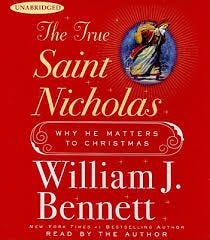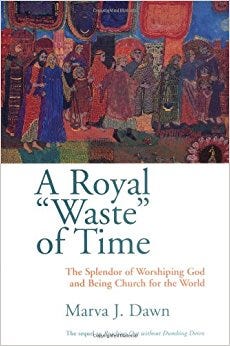CREC Hotspot Project, Three Book Reviews, and Anons For Hitler
Some book reviews as well as some updates!
My latest interview with Dr. Steve Jeffery is now available!
The CREC has been growing significantly in the last few years. As a result, some have been striving to ensure that our networks align and that our work is not lost in the vast social media algorithm.
Dr. Jeffery and others have worked to streamline our resources, making it easier for people to find us in the U.S.
I hope this episode will expand this vision, and many will have a better sense of the locations of our churches and perhaps even consider joining them.
Steve and I offer salient pastoral advice towards the end of the podcast. So, listen to the end!
You can find the project here: https://allsaintskirk.com/hotspot/
Book Reviews
The True Saint Nicholas by Bill Bennett
There are too many unknown facts, as Bill Bennett rightly asserts. Much of the historical data is purely speculative, with the exception of a few references, poems, and prayers in honor of Saint Nicholas. The Roman Catholic tradition has largely exorcised ol’ St. Nicholas from the Church, while the Eastern Orthodox tradition continues celebrating his life every December 6th.
Bennett provides a pleasant read filled with fantastical stories and a delightful context to the Bishop of Myra.
The records, at the very least, seem to concur with the general perception that the Saint Nicholas that existed in the days of Constantine (yes, he most likely slapped Arius!) was indeed filled with generosity and abounding love for all sorts of people.
Bennett illustrates that Saint Nicholas, the Bishop, had become commercialized only a few centuries after his death. The entrepreneurial spirit was alive and well in those days. Manipulative men used the life of Saint Nicholas to sell and attract business. This commercialization is no different than the Americanized Santa Claus (invented much later in the 20th century).
At the same time, it is important to note that abuses are always prone to happen and that simply doing away with the figure in order to avoid the tough questions is no way to handle the matter. Instead, there is a legitimate way to use the history of Saint Nicholas and its subsequent re-adaptation– with all its colors and jolly-ness in the North Pole Santa Claus– to draw us and our children’s attention to those rare gifts and virtues of the Christian faith.
Bill Bennett connects the modern Santa Claus with the faithful Bishop who suffered and lived for the sake of his Lord. The connection provides us with a healthy knowledge of the origins of this delightfully rotund figure loved by many whose history is frequently forgotten.
The book offered a portrait of an ancient Christian figure whose life was dedicated to giving gifts and relieving the suffering of many. For this reason alone, Saint Nicholas is to be celebrated and remembered.
Holiness by Grace by Bryan Chapell
Bryan Chapell’s work is a tour de force. Pastorally and academically equipped, Dr. Chapel engineers his way through the topic of holiness. While he could easily fall into some theological traps along the way, he meticulously works through a myriad of texts and provides deep insight into the work of God in sinners.
Holiness is not an impossible task; it is our calling. Holiness is not a legalistic demand of a holy God, but a holy God calls us to holiness because He is holy. But this holiness is not a joyless pursuit. It is a work of grace; the kind of grace that produces joy and promotes godliness.
Holiness is applied to everything we do, from parenting to counseling. Filled with helpful insights and stories that engage the mind and the heart, Chapell equips the reader to see our status as saints, our journey as sinners, and our destiny as recipients of glory.
The book exalts the grace of God in our works by emphasizing that salvation is not by works, but salvation works. Or, as the Reformers stated, “Faith alone saves, but faith is not alone.” The antinomian tendency in certain groups derails our labors as Christians to obey and cherish God’s holy laws. Antinomian theology confuses the work of grace and fails to promote godliness. Our security in Christ is not an excuse to sin but a call to grow in grace. On the other hand, individual calls to holiness may rely too heavily on the human ability to overcome sin. Both ideas—antinomianism and neo-nomism—endanger the journey of holiness.
Ultimately, our holiness should lead us to repentance, a true life of confession. And this repentance should prompt us to doxologize (89). While we struggle with temptations and while God tests our faith, God provides the motivation and grace to delight us in our journey daily.
A “Royal” Waste of Time by Marva Dawn
Marva Dawn says that worship is a “royal waste of time.” Of course, she is not referring to worship being purposeless, she is speaking of worship as a way of losing our lives (Matt. 10:39).
Worship is royal because it invites us to the throne room of God. But worship is a waste of time because, in the eyes of the world, it is a trivial pursuit. Worship as a royal waste of time enables us to keep heavenly time and forget earthly concerns. A royal waste of time is what we need to do more, not less. We need to spend our sense of self-righteousness and gain more from the heavenly clock, which calls us promptly to see our unworthiness in the splendor of God’s holiness.
Throughout these many lectures, the writer speaks profoundly about loss in evangelical worship. Not only has the church over-hyped technology (85), but she has also lost her sense of wonder (118). Dawn addresses the church's central need to restore the centrality of worship and a vision for the God of worship.
She works through various components of church life and urges the church to restore what’s been lost with the church’s worldly infatuation. With deep care and tenderness, Marva Dawn addresses a series of letters to concerned parishioners and overwhelmed pastors.
Filled with a healthy dose of theological insight, Dawn presents a God beyond our reach and within our grasp: immanent and transcendent. The church’s loss of identity comes when she believes her time is better spent inventing new ways of worship.
This reviewer did not agree with all her exegesis (especially of Col. 3) but found Dawn to be a unique and necessary voice for our age. Further, there is no greater beauty than the beauty of God’s holiness. Each church needs to be aware that worldly perceptions of the church are not nearly as important and a royal waste of time in the things of God is our urgent cry.
Another great addition to this masterful piece is that she speaks from a Lutheran perspective which means part of this royal waste is to see the church calendar as a fundamental way to keep time. Dawn urges the church to sing a new song, to catechize our imagination with wonder for the Triune God.
Notations
My lengthy back-and-forth on the anon kerfuffle back in April has been brought back up. You can update yourself with my post here.
Doug Wilson’s recent response is fantastic, and you should listen to it. The only problem with it is that it is too common-sensical. And that is a problem for a lot of people. It is too full of careful distinctions, which is a problem for many people. That said, here are 20 minutes of problematic gold!
Nuntium
Some big announcements are coming in the next few weeks. I am hopeful a couple of great opportunities will be confirmed soon.
Also, a very generous reader has taken his time to work on my substack. My About page is updated, and there is also a Bonus page for additional content.
I will be in Chile in mid-January for a conference on post-millennialism hosted by my friend, Nathan Anderson. It will be my first time in Chile, and I am eager to see their work on the ground!





